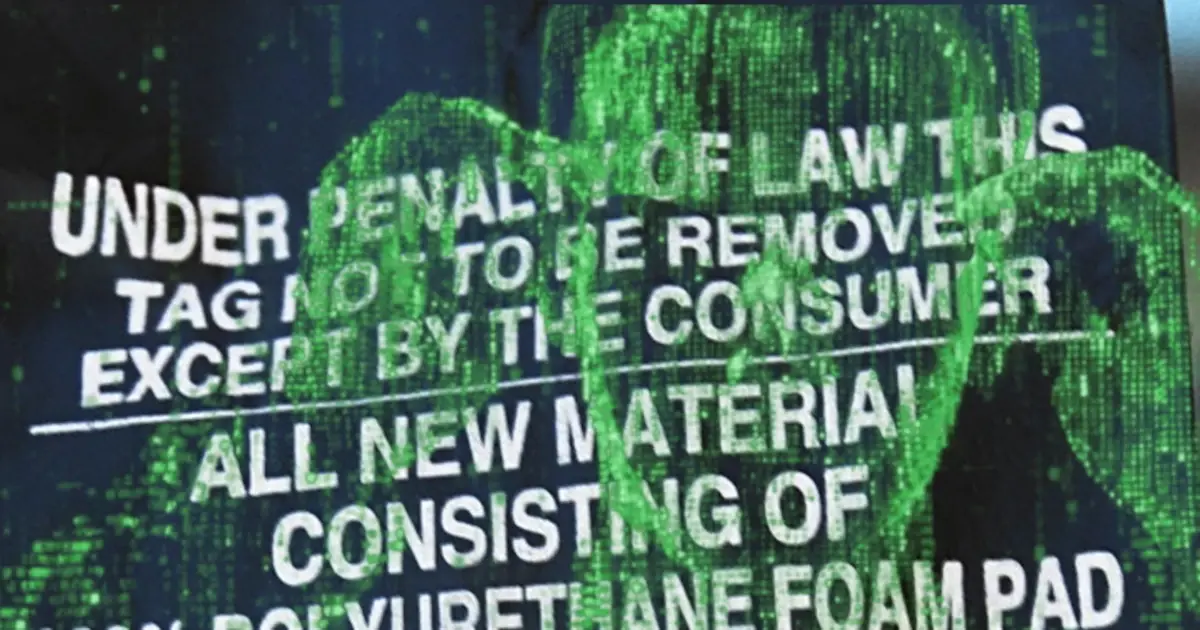Related Topics
Let The Robots Do It
Is grinding out math problems just busy work? Is the current state of Math class curriculum hampering the real life deployment of engineering skills?
Don’t Worry About It
Right to Repair is going global and Stephen might have solved his injection molded component's void by tweaking the mold design.
The Digital Mattress
Hyron and Zapp from the AND!XOR group joins the podcast this week to continue the discussion on the Right to Repair and Non Fungible Tokens.
Other Resources
Circuit Break Podcast
Webinars
Videos
Tour MacroFab's ITAR-Compliant Facility
July 22, 2021, Episode #286
The debate around repair restrictions illustrates the limitations of MMWA’s anti-tying provision in repair markets. While the anti-tying provision gives consumers the right to make repairs on their own or through an independent repair shop without voiding a product’s warranty, repair restrictions have made it difficult for consumers to exercise this right. Although manufacturers have offered numerous explanations for their repair restrictions, the majority are not supported by the record.
- How manufacturers may limit repairs by consumers and repair shops, and how those limitations may increase costs, limit choice, and impact consumers’ rights under the Magnuson-Moss Warranty Act
- The statute is remedial and is intended to protect consumers from deceptive warranty practices
Consumer products are not required to have warranties, but if one is given, it must comply with the Magnuson-Moss Act. - Defines definitions and disclosure standards
- Bars manufacturers from using access to warranty coverage as a way of obstructing consumers’ ability to have their consumer products maintained or repaired using third-party replacement parts and independent repair shops.
- The statute is remedial and is intended to protect consumers from deceptive warranty practices
- A manufacturer with market power that has refused to provide consumers or aftermarket service providers with key inputs (such as parts, manuals, or diagnostic software and tools) may be subject to antitrust liability for maintaining its monopoly, if the effect of such conduct is to harm competition
- What ismarket power?
- A manufacturer that has succeeded in limiting the availability of parts through explicit or de facto exclusive dealing contracts with preferred service providers may be charged with using such contracts to maintain a monopoly
- Repair Restrictions
- Physical
- Right to repair advocates argue that consumers care about repairability, in addition to aesthetic design, but do not have the necessary information at the point of sale to purchase products that are repairable
- iFixit has a repair index for devices
- Should manufacturers disclose how “repairable” the device is?
- Reports indicate that consumers would rather have a long lasting device over a “sexy” device.
- Restrictions on parts, repair manuals, software, tools
- Designs making repair unsafe
- manufacturers provided no data to support their argument that injuries are tied to repairs performed by consumers or independent repair shops.
- Telematics
- Quality of Service of the Repair Process
- Dealerships suck in terms of service
- Mainly covers safety and “proper repairs”
- Microsoft battery/screw thermal event
- Microsoft noted that off specification power supply units, which do not meet Microsoft’s quality standards, caused at least 12 “serious overheating incidents” resulting in device damage
- Right to Repair advocates state that OEMs do this to themselves by not providing proper documentation on repair practices
- Application of patent rights / Trademarks
- Disparagement of non-OEM parts
- Software locks
- EULAs
- Liability and Reputational Harm
- Initial press coverage of failures of consumer devices seldom, if ever, attempts to determine whether the device had been repaired by an independent service provider or refurbished with parts that did not meet OEM standards
- Follow-up coverage may ultimately identify inferior third-party repairs and parts as the culprit, but this is likely to do little to overcome the initial impression made on consumers
- Right to repair advocates that manufacturers are creating liability for themselves by withholding information from third parties on how to fix products
OEMs routinely throw aftermarket suppliers under the bus even if they are the “OEM” part already.- Takata Air Bags
- Manufacturers provided no empirical evidence to support their concerns about reputational harm or potential liability resulting from faulty third party repairs.
- Physical
- Talking points for right to repair
- Timing of Repairs
- Price of repairs
- Environmental Harm
- Small Businesses and Employment
- What can the FTC actually do?
- Revise its Interpretations of the MMWA to
- Make clear that certain repair restrictions could violate the MMWA
- Is this like the ATF “reinterpreting the laws”?
- Self-regulation
- While industry self-regulation can be beneficial, the broad range of industries and products involved would make it a challenge to create and implement a single self-regulatory scheme. And, aside from the auto industry, no other manufacturing sectors have successfully created and implemented one
Legislation that implements
- While industry self-regulation can be beneficial, the broad range of industries and products involved would make it a challenge to create and implement a single self-regulatory scheme. And, aside from the auto industry, no other manufacturing sectors have successfully created and implemented one
- Could require a manufacturer to make available to individuals and independent repair shops those parts that the manufacturer provides to its authorized repair network, the EU prescribes the types of parts and time period during which the parts must be made available
- Transparency of Repairability by OEMs/Industry
About the Hosts

Parker Dillmann
Parker is an Electrical Engineer with backgrounds in Embedded System Design and Digital Signal Processing. He got his start in 2005 by hacking Nintendo consoles into portable gaming units. The following year he designed and produced an Atari 2600 video mod to allow the Atari to display a crisp, RF fuzz free picture on newer TVs. Over a thousand Atari video mods where produced by Parker from 2006 to 2011 and the mod is still made by other enthusiasts in the Atari community.
In 2006, Parker enrolled at The University of Texas at Austin as a Petroleum Engineer. After realizing electronics was his passion he switched majors in 2007 to Electrical and Computer Engineering. Following his previous background in making the Atari 2600 video mod, Parker decided to take more board layout classes and circuit design classes. Other areas of study include robotics, microcontroller theory and design, FPGA development with VHDL and Verilog, and image and signal processing with DSPs. In 2010, Parker won a Ti sponsored Launchpad programming and design contest that was held by the IEEE CS chapter at the University. Parker graduated with a BS in Electrical and Computer Engineering in the Spring of 2012.
In the Summer of 2012, Parker was hired on as an Electrical Engineer at Dynamic Perception to design and prototype new electronic products. Here, Parker learned about full product development cycles and honed his board layout skills. Seeing the difficulties in managing operations and FCC/CE compliance testing, Parker thought there had to be a better way for small electronic companies to get their product out in customer's hands.
Parker also runs the blog, longhornengineer.com, where he posts his personal projects, technical guides, and appnotes about board layout design and components.

Stephen Kraig
Stephen Kraig is a component engineer working in the aerospace industry. He has applied his electrical engineering knowledge in a variety of contexts previously, including oil and gas, contract manufacturing, audio electronic repair, and synthesizer design. A graduate of Texas A&M, Stephen has lived his adult life in the Houston, TX, and Denver, CO, areas.
Stephen has never said no to a project. From building guitar amps (starting when he was 17) to designing and building his own CNC table to fine-tuning the mineral composition of the water he uses to brew beer, he thrives on testing, experimentation, and problem-solving. Tune into the podcast to learn more about the wacky stuff Stephen gets up to.
Special thanks to whixr over at Tymkrs for the intro and outro!
Related Podcasts

Let The Robots Do It
Is grinding out math problems just busy work? Is the current state of Math class curriculum hampering the real life deployment of engineering skills?

The Right to Repair
What is the Right to Repair and what could be the impacts for electrical engineers, designers, contract manufactures and component suppliers.

The Digital Mattress
Hyron and Zapp from the AND!XOR group joins the podcast this week to continue the discussion on the Right to Repair and Non Fungible Tokens.

Don’t Worry About It
Right to Repair is going global and Stephen might have solved his injection molded component's void by tweaking the mold design.
About MacroFab
MacroFab offers comprehensive manufacturing solutions, from your smallest prototyping orders to your largest production needs. Our factory network locations are strategically located across North America, ensuring that we have the flexibility to provide capacity when and where you need it most.
Experience the future of EMS manufacturing with our state-of-the-art technology platform and cutting-edge digital supply chain solutions. At MacroFab, we ensure that your electronics are produced faster, more efficiently, and with fewer logistic problems than ever before.
Take advantage of AI-enabled sourcing opportunities and employ expert teams who are connected through a user-friendly technology platform. Discover how streamlined electronics manufacturing can benefit your business by contacting us today.